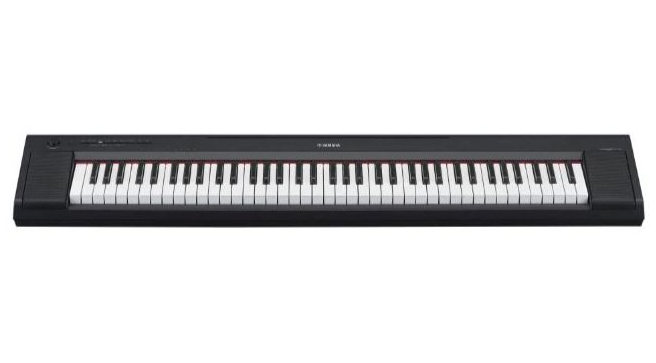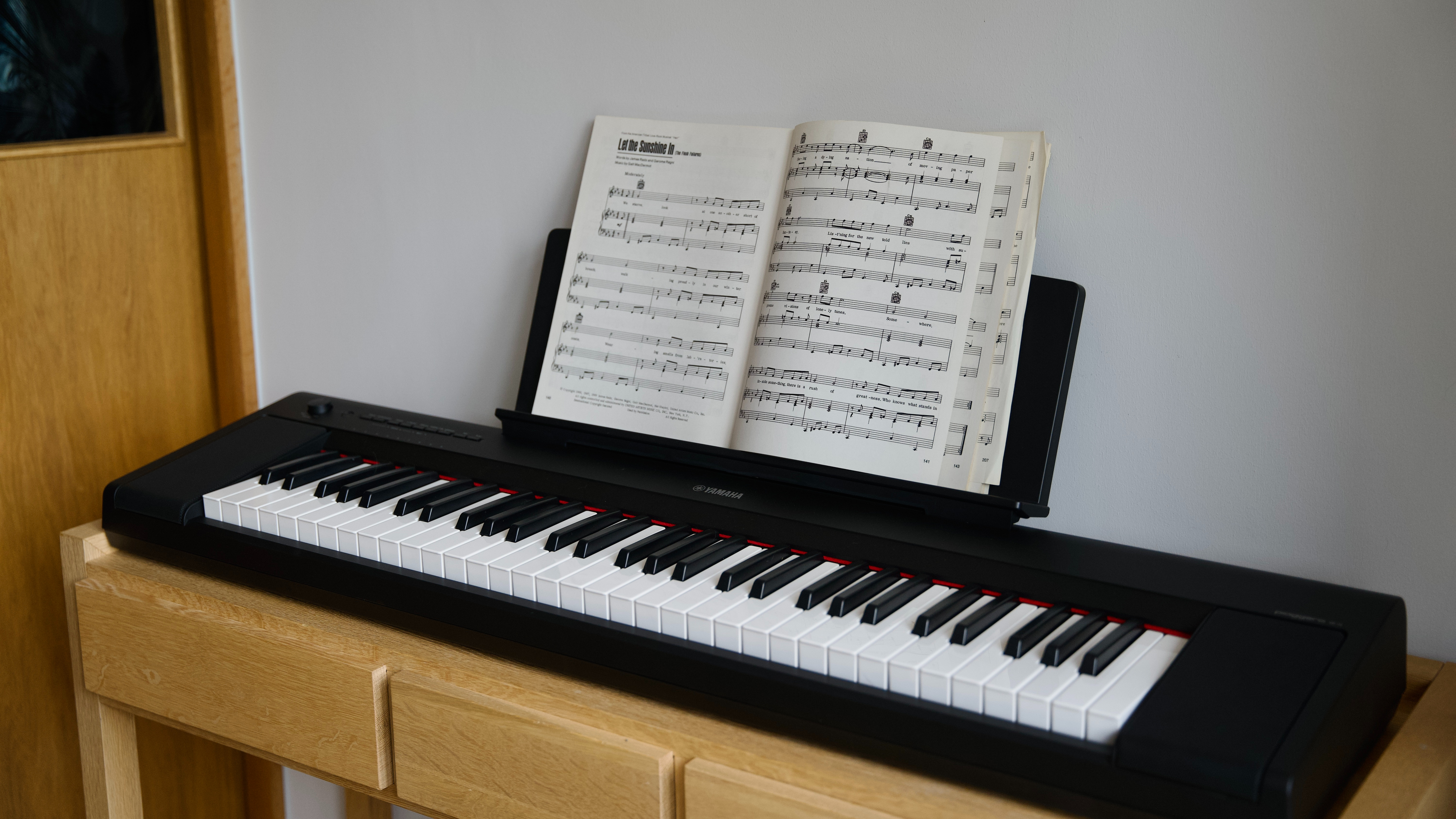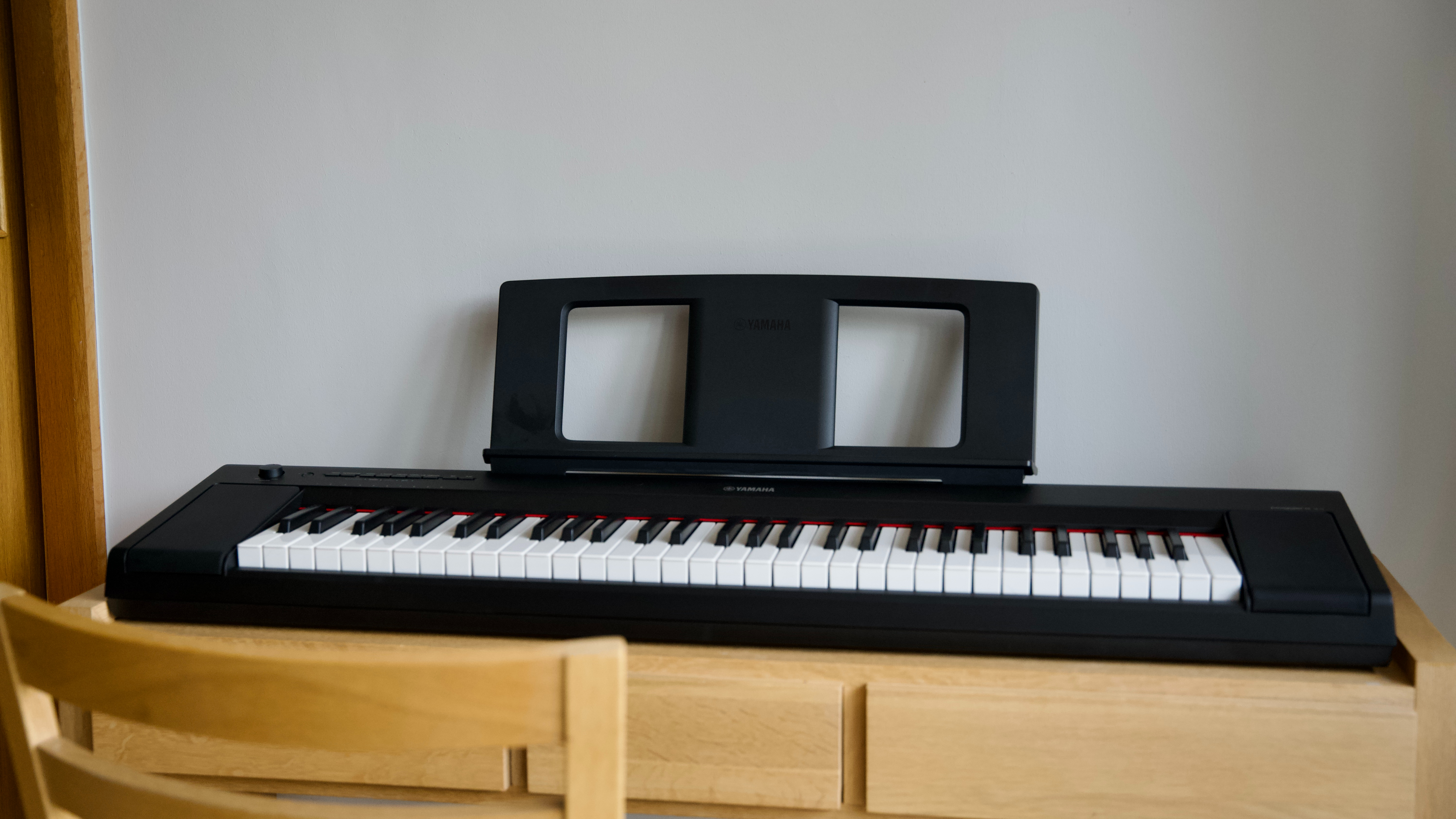MusicRadar Verdict
Like its predecessor, the NP-15 is a fantastic entry-level piano and an excellent instrument for those who want to play on the go. That said, it doesn't offer much more in the way of extra features when compared to the previous cheaper model.
Pros
- +
Affordable option
- +
Lightweight and sturdy
- +
Simple to use
- +
Great portability
Cons
- -
Not drastically improved from the previous model
- -
Sustain pedal and stand not included
- -
No Bluetooth MIDI connection
MusicRadar's got your back
Yamaha NP-15 review: what is it?
First things first, the Yamaha NP-15 is a great model for newcomers. It's competitively priced and made with beginners in mind. It has unweighted but touch-sensitive keys, making playing effortless without requiring a lot of technique - perfect for beginners looking to jump-start their learning and make their overall first experiences with piano fun.
The no-frills design means there isn't a fancy LED display, just a sober - but oddly satisfying - volume knob and ten discrete control buttons. We must admit, we like the minimal look and both colour options - black and white. The simplicity of the design is continued through to the sound of the piano. Yamaha has opted for quality over quantity here, with the keyboard coming loaded with 15 high-quality voices featuring the sound of Yamaha's iconic full-concert grand piano.
Weighing in at just 5.2kg, the NP-15 is a particularly lightweight model. It's also compact and battery-powered, making it ideal for transporting and storing away - great if you don't intend on the keyboard becoming a permanent fixture.
It has two 2.5W built-in speakers that are certainly loud enough and sound very nice in our living room. Alternatively, headphones can be plugged in for quiet practice. It has the capability to record and playback your piano compositions and comes preloaded with 25 not-so-cheesy songs that you can play along to.
The keyboard can be connected via USB to use as a MIDI controller or linked to Yamaha's 'Smart Pianist' app, which can enhance your playing experience.
Although Yamaha offers a range of stands, you do not get one included in the box. This keyboard also doesn't include a sustain pedal. However, you do have the option to connect one.
Yamaha NP-15 review: performance & verdict

Design and style
The Piaggero series is Yamaha's entry-level piano range, and despite being affordable, it still comes with Yamaha's years of experience making top-quality instruments and audio equipment. As soon as it's out of the box, you know you're holding an instrument made with a real savoir-faire; feeling sturdy and well-made.
It looks the part, too. The design is minimal, while elements such as the red felting that sits along the base of the keys, the matt black finish and the pleasing knob give the piano an understated and classy look.
You can trust that this piano's small price tag isn't the result of cheap manufacturing but rather of the simplicity of its design. The name Piaggero comes from merging the words' piano' and 'leggero' - meaning 'light' in musical terms. The name illustrates Yamaha's intention to offer simple and lightweight instruments at an affordable price, and we think they've nailed it.
Playability and feel
I would normally suggest that novice players choose an 88-weighted key piano, but the NP-15 has made me reassess this assertion. This model might just be the perfect beginner keyboard.
On an acoustic piano, the keys - due to the complex mechanism - have a weighted action when pressed, which allows for a greater expression in the dynamic of each note. Of course, electronic keyboards tend to try their hardest to recreate that feeling, but this keyboard doesn't. Instead, it has touch-sensitive keys. These lighter keys still allow you to play dynamically but without the need for any finger strength or articulation techniques - making the NP-15 incredibly easy to play and instantly fun.
The NP-15 only has 61 keys which you may think would limit what songs you can play, but it should be enough if you're playing jazz tunes or pop accompaniments. After all, even great composers such as Mozart and Chopin composed music on keyboards that only had four or five octaves. Be that as it may, if you're looking for some extra keys, the NP-15 has a big brother, the NP-35, which has 76 keys.

Sounds and tone
Now, what's new with the NP-15 compared to its predecessor, the Piaggero NP-12? Five new sounds. You can choose from 12 high-quality voices, ten that are also on the NP-12, plus five brand-new ones.
In total, there are three pianos, three e-pianos, three organs, two harpsichords, vibraphone, acoustic strings and two pads. With the exception of the strings - which don't sound very authentic, in our opinion - the others sound pretty good, with a lot of depth and surprisingly rich harmonics.
Our only wish is that these could be modernised. It does feel like the range of sounds, particularly the electric pianos, haven't been updated since the '90s - maybe they're waiting for them to come back into fashion?
We would have preferred that they ditch one of the harpsichord sounds for a more trendy dreamy felted piano or one of the e-pianos for a contemporary plucky synth sound; kids now would probably prefer to play Harry Styles than Stevie Wonder.
With all that said, the keyboard does offer enough sonic flexibility with the choice of six reverbs, allowing you to recreate the sound of three different concert halls, a cathedral and a small room with an option to adjust their depth. You can also easily customise the damper resonance when using a sustain pedal which will affect how long the notes will ring when sustained. Very neat.
The NP-15 has slightly larger speakers than the previous model, but they have the same power, so the difference in volume is minimal. You can, of course, plug in headphones if you want privacy or to stay friendly with your neighbours.

Features and extras

Yamaha NP-35: Looking for more notes? Well, we'd highly recommend checking out the 76-key NP-35. This keyboard shares the same features as the NP-15, just in a larger format.
Roland GO-61K: Roland’s unique and entertaining take on the portable arranger keyboard has something for everyone and even has built-in Bluetooth.
Casio CT-S1: Pretty much the perfect beginner’s keyboard, the Casiotone CT-S1 offers great sounds and playability at a very competitive price.
The NP-15 is a little over a metre long, so it doesn't take up much space at all. It's also extremely lightweight, clocking in at a mere 5.2kg. This makes this humble keyboard easy to move around and ideal if you plan on storing the piano when it's not being used.
As we previously mentioned, the stand doesn't come as standard, but Yamaha does make a couple of options that can be purchased separately. If you are after a single-braced stand, then the PKBS1 is ideal, for a more sturdy alternative, the double-braced PKBX2 works a treat, and lastly, if you want something a little more bespoke, the L3C is a fantastic option.
As there are only 61 keys, naturally there's an octave shift function. You can switch by holding down the 'metronome’ key and the keys on your keyboard simultaneously; however, we did find this to be a little clumsy. Having the typical '+' and '-' buttons found on a MIDI controller would make this way easier to navigate - especially while performing.
The Yamaha NP-15 also features a metronome and the choice of three different tunings - 414.8 Hz, 440.0 Hz, and 466.8 Hz. However, the metronome doesn't allow you to select specific tempos, so you will have to dial it in by ear.
Regarding connectivity, the NP-15 has a USB port allowing you to connect to a computer, transforming the keyboard into a MIDI controller. Although, if you were using it for studio productions, you might want to find a more specialised keyboard that has more features, such as a mod wheel, pitch control, pads, etc. That said, for beginner pianists, that's unlikely to be a concern.
Newbies will be happy to know that it's possible to connect to two of Yamaha's popular piano apps, Smart Pianist and Rec'n'Share. Not only will this be sure to enhance your playing experience, but you can also easily record and film yourself playing so you can track your progress. But unfortunately, you will need to purchase the UD-BT01 MIDI Bluetooth connector in order to do this.
We have to mention that other models in a similar price bracket, such as the Roland GO-61P, come with built-in wireless connectivity, which is something you might want to consider if you think this is a feature you will be using a lot.
Lastly, we need to discuss the price. Now, for us, this might just be the NP-15's biggest selling point. Retailing for just under $/£300, it really is an impressive price point for such a fantastic instrument.

Final verdict
So is the NP-15 a massive upgrade from the NP-12? Well, not really. Yamaha has stuck to the winning formula of the original unit but tweaked it ever so slightly by adding five new voices and a few other minor details.
However, this superb beginner keyboard is easy to recommend for those taking their first steps into the wonderful world of digital pianos.
Nevertheless, the older NP-12 is still available at select dealers and with sizable discounts applied while they make space for the arrival of this shiny new model, the NP-12 could be a better investment until they disappear from stores completely.
Yamaha NP-15 review: hands-on demos
Yamaha Global
Yamaha NP-15 review: Specifications
- Keyboard: 61-note touch sensitive (Box Type)
- Polyphony: 64-note Polyphony
- Effects: Digital Reverb (6 Types)
- Connectivity: USB-to-Host, Sustain pedal, Headphones
- Dimensions: Width 1,052mm (41-7/16"), Height 104mm (4-1/8"), Depth 260mm (10-1/4")
- Preset Number of Voices: 15 (Concert Grand, Mellow Grand, Bright Grand, DX E. Piano, Stage E. Piano, Vintage E. Piano, Organ Principal, Organ Tutti, Jazz Organ, Harpsichord 8', Harpsichord 8’+4', Vibraphone, Strings, Strings Pad, Synth Pad)
- Power Supply: AC Adaptor (PA-130) 12V or 6 x "AA" size batteries (alkaline, manganese, or Ni-MH rechargeable batteries)
- Power Consumption: 3.5W (When using PA-130 AC adaptor)
- Contact: Yamaha
Quentin is a composer specialising in writing for contemporary dance, theatre and film. He is also a classically trained pianist and multi-instrumentalist. One half of trip-hop duo Moon Thrills, Quentin also teaches songwriting to the undergraduate students at LCCM in London. He has a newly discovered passion for sound synthesis and finds it a great way to explore new and exciting ways to develop his music.











